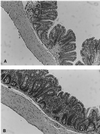Differential induction of colitis and gastritis in HLA-B27 transgenic rats selectively colonized with Bacteroides vulgatus or Escherichia coli
- PMID: 10338507
- PMCID: PMC96608
- DOI: 10.1128/IAI.67.6.2969-2974.1999
Differential induction of colitis and gastritis in HLA-B27 transgenic rats selectively colonized with Bacteroides vulgatus or Escherichia coli
Abstract
Resident bacteria play an important role in initiating and perpetuating gastrointestinal inflammation. We previously demonstrated that six commensal bacteria including Bacteroides vulgatus caused more aggressive colitis and gastritis in HLA-B27 transgenic rats than did the other five bacteria without B. vulgatus. This study compared the degree of gastrointestinal inflammation in gnotobiotic HLA-B27 transgenic rats monoassociated with either B. vulgatus or Escherichia coli. Gnotobiotic transgenic rats raised in Trexler isolators were selectively colonized with either B. vulgatus or E. coli. Control rats were either germfree or colonized with six common commensal bacteria (Streptococcus faecium, E. coli, Streptococcus avium, Eubacterium contortum, Peptostreptococcus productus, and B. vulgatus [DESEP-B]). After 1 month, all the rats were killed and tissues were prepared for histologic and biochemical evaluation. Colitis induced by B. vulgatus monoassociation was almost equal to that in DESEP-B-colonized rats and was significantly more severe than E. coli-induced colitis, which was absent by histological testing and mild by colonic myeloperoxidase and interleukin-1beta concentration determinations. However, gastritis was detectable only in DESEP-B-associated rats. These studies suggest that not all resident bacteria have equal proinflammatory capabilities, since B. vulgatus alone is more active than E. coli alone in inducing colitis, and that colitis and gastritis result from different luminal bacterial stimuli.
Figures



Similar articles
-
CD4(+) T lymphocytes mediate colitis in HLA-B27 transgenic rats monoassociated with nonpathogenic Bacteroides vulgatus.Inflamm Bowel Dis. 2007 Mar;13(3):317-24. doi: 10.1002/ibd.20040. Inflamm Bowel Dis. 2007. PMID: 17206701
-
Lactobacillus GG prevents recurrence of colitis in HLA-B27 transgenic rats after antibiotic treatment.Gut. 2003 Mar;52(3):370-6. doi: 10.1136/gut.52.3.370. Gut. 2003. PMID: 12584218 Free PMC article.
-
Normal luminal bacteria, especially Bacteroides species, mediate chronic colitis, gastritis, and arthritis in HLA-B27/human beta2 microglobulin transgenic rats.J Clin Invest. 1996 Aug 15;98(4):945-53. doi: 10.1172/JCI118878. J Clin Invest. 1996. PMID: 8770866 Free PMC article.
-
Role of commensal bacteria in chronic experimental colitis: lessons from the HLA-B27 transgenic rat.Pathobiology. 2002-2003;70(3):131-8. doi: 10.1159/000068144. Pathobiology. 2002. PMID: 12571416 Review.
-
Colitis in HLA-B27/beta 2 microglobulin transgenic rats.Int Rev Immunol. 2000;19(1):39-50. doi: 10.3109/08830180009048388. Int Rev Immunol. 2000. PMID: 10723676 Review.
Cited by
-
Role of the gut microbiota in immunity and inflammatory disease.Nat Rev Immunol. 2013 May;13(5):321-35. doi: 10.1038/nri3430. Nat Rev Immunol. 2013. PMID: 23618829 Review.
-
Toxoplasma gondii rhoptry 16 kinase promotes host resistance to oral infection and intestinal inflammation only in the context of the dense granule protein GRA15.Infect Immun. 2013 Jun;81(6):2156-67. doi: 10.1128/IAI.01185-12. Epub 2013 Apr 1. Infect Immun. 2013. PMID: 23545295 Free PMC article.
-
The commensal Escherichia coli CEC15 reinforces intestinal defences in gnotobiotic mice and is protective in a chronic colitis mouse model.Sci Rep. 2019 Aug 7;9(1):11431. doi: 10.1038/s41598-019-47611-9. Sci Rep. 2019. PMID: 31391483 Free PMC article.
-
Bacterial Signaling at the Intestinal Epithelial Interface in Inflammation and Cancer.Front Immunol. 2018 Jan 5;8:1927. doi: 10.3389/fimmu.2017.01927. eCollection 2017. Front Immunol. 2018. PMID: 29354132 Free PMC article. Review.
-
Sialylation and fucosylation modulate inflammasome-activating eIF2 Signaling and microbial translocation during HIV infection.Mucosal Immunol. 2020 Sep;13(5):753-766. doi: 10.1038/s41385-020-0279-5. Epub 2020 Mar 9. Mucosal Immunol. 2020. PMID: 32152415 Free PMC article.
References
-
- Aranda R, Sydora B C, McAllister P L, Binder S W, Yang H Y, Targan S R, Kronenberg M. Analysis of intestinal lymphocytes in mouse colitis mediated by transfer of CD4+, CD45RBhigh T cells to SCID recipients. J Immunol. 1997;158:3464–3473. - PubMed
-
- Auer I O, Roder A, Wensinck F, van de Merwe J P, Schmidt H. Selected bacterial antibodies in Crohn’s disease and ulcerative colitis. Scand J Gastroenterol. 1983;18:217–223. - PubMed
-
- Brandwein S L, McCabe R P, Cong Y, Waites K B, Ridwan B U, Dean P A, Birkenmeier E H, Sundberg J P, Elson C O. Spontaneously colitic C3H/HeJ Bir mice demonstrate selective antibody reactivity to antigens of the enteric bacterial flora. J Immunol. 1997;159:44–52. - PubMed
-
- Breban M, Fernandez-Sueiro J L, Richardson J A, Hadavand R R, Maika S D, Hammer R E, Taurog J D. T cells, but not thymic exposure to HLA-B27, are required for the inflammatory disease of the HLA-B27 transgenic rats. J Immunol. 1996;156:794–803. - PubMed
Publication types
MeSH terms
Substances
Grants and funding
LinkOut - more resources
Full Text Sources
Other Literature Sources
Medical
Research Materials

